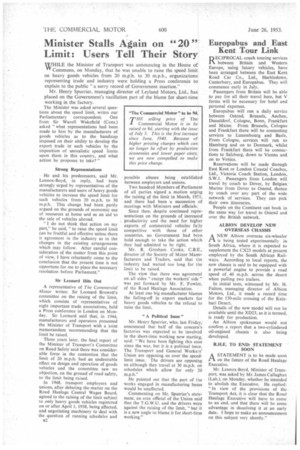Minister Stalls Again on " 20 " Limit: Users Tell Their Story
Page 36

If you've noticed an error in this article please click here to report it so we can fix it.
WHILE the Minister of Transport was announcing in the House Of " Commons, on Monday, that he was unable to raise the speed limit on heavy goods vehicles from 20 m.p.h. to 30 m.p.h., organizations representing trade and industry were holding a Press conference to explain to the public "a sorry record of Government inaction." Mr. Henry Spurner, managing director of Leyland Motors, Ltd., has placed on the Government's vacillation part of the blame for short-time working in the factory. The Minister was asked several questions about the speed limit, writes our Parliamentary correspondent. One from Sir Wavell Wakefield (Cons.) asked "what representations had been made to him by the manufacturers of goods vehicles as to the handicap imposed on their ability to develop the export trade in such vehicles by the imposition of unrealistic speed limits upon them in this country, and what action he proposes to take?"
Strong Representations He and his predecessors, said Mr. Lennox-Boyd, in reply, had been strongly urged by representatives of the manufacturers and users of heavy goods re speed limit t
vehicles to increase mit for
such vehicles from 20 m.p.h. to 30 m.p.h. This change had been partly argued on the grounds of economic use me and as an aid to
of resources at ho the sale of vehicles abroad.
"1 do not think that action on my part," he said. " to raise the speed limit can be fruitful and effective unless there is agreement in the industry as to them changes in the existing arrangements which may follow. After careful consideration of the matter from this point of view, I have reluctantly come to the conclusion that the present time is not opportune for me to place the necessary resolution before Parliament."
Sir Leonard Hits Out
A representative of The Commercial Motor writes: Sir Leonard Browett's committee on the raising of the limit, which consists of representatives of eight important trade associations, held a Press conference in London on Monday. Sir Leonard said that, in 1944, manufacturers and operators presented the Minister of Transport with a joint memorandum recommending that the limit be raised. Three years later, the final report of the Minister of Transport's Committee on Road Safety said there was considerable force in the contention that the limit of 20 m.p.h. had an undesirable effect on design and operation of goods vehicles and the committee saw no objection, on the ground of road safety, to the limit being raised. In 1948, transport employers and unions, after debating the matter on the Road Haulage Central Wages Board, agreed to the raising of the limit subject to only heavy goods vehicles registered on or after April 1, 1938, being affected, and negotiating machinery to deal with the question of running schedules and
n?.
possible abuses being established between employers and unions. Two hundred Members of Parliament of all parties signed a motion urging the raising of the limit in March, 1951, and there had been a succession of meetings with Ministers and officials. Since then, despite continued representations on the grounds of increased productivity and the need for higher exports of commercial vehicles fully competitive with those of other countries, no Government had been bold enough to take the action which they had admitted to be right. Mr. R. Gresham Cooke, C.B.E., director of the Society of Motor Manufacturers and Traders, said that tae industry had waited too long for fle limit to be raised. The view that there was agreement on all sides "except the workers' side" was put forward by Mr. F. Fowler, of the Road Haulage Association. At least one big manufacturer blames the falling-off in export markets for heavy goods vehicles to the refusal to raise the limit.
"A Political Issue" "A Political Issue" Mr. Henry Spurner, ie who, last Friday, nnounced that half of the concern's
factories was expected to be involved in the short-time working now starting, said: "We have been fighting this case since the war, but it is a political issue. The Transport and General Workers' Union are opposing us over the speedlimit issue. The drivers are opposing us although they travel at 30 m.p.h. on schedules which allow for only 20 m.p.h." He pointed out that the part of tbe works engaged in manufacturing buses would be unaffected. Commenting on Mr. Spurr state ment, n area official ier's ate
ment, an of the Union said
that the T.G.W.U. and the drivers were against the raising of the limit, "but it is a new angle to blame it for short-time working."




































































































